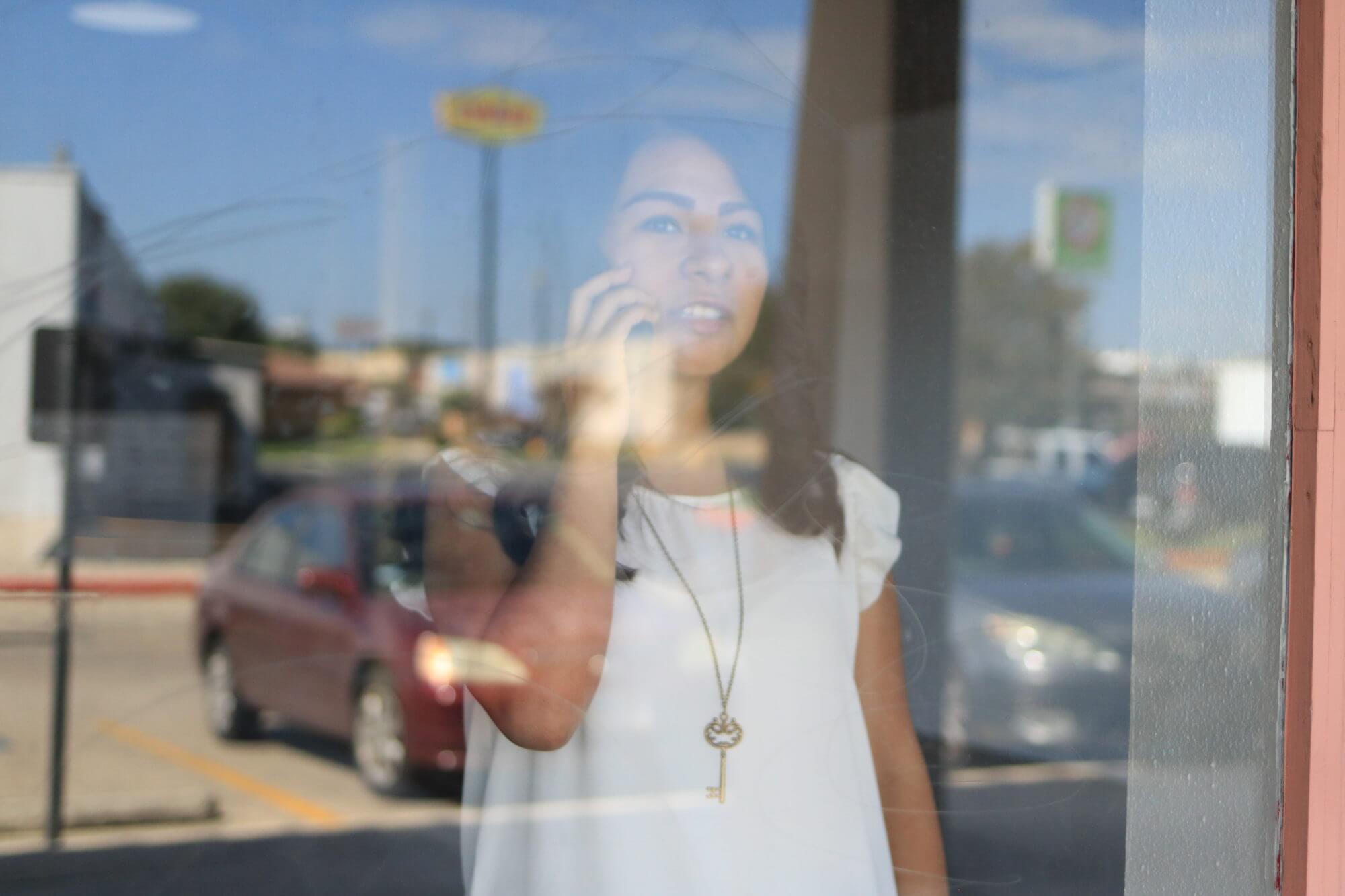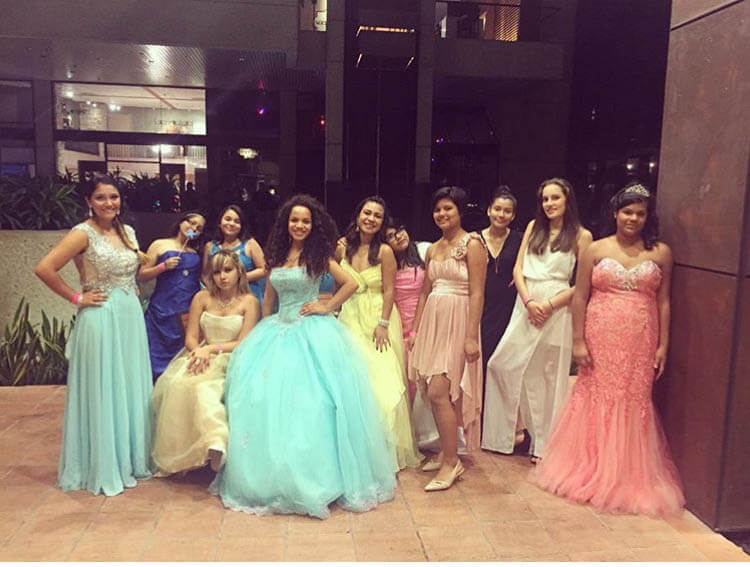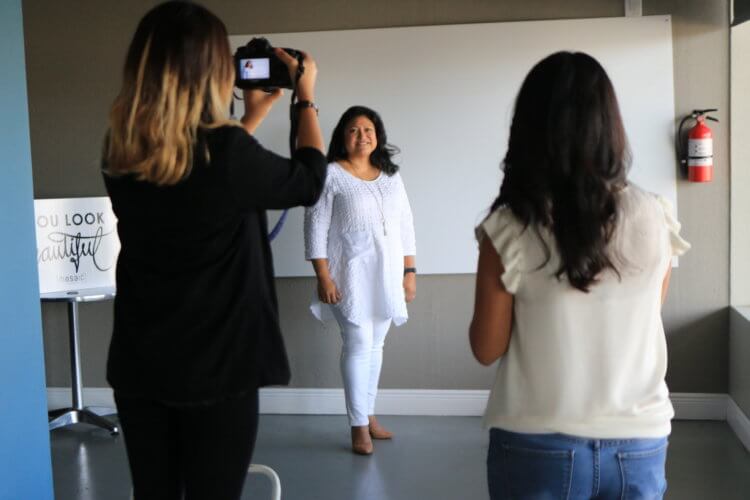
In 2012, Carmen Lidia De La Rosa received an invitation to a military ball at the University of Texas at San Antonio but she could not afford a dress. For hours, a woman named Melissa Menchaca, who De La Rosa knew through a mutual friend, dug through about 900 dresses that hung on racks and lay on the floor until the pair settled on a royal purple, strapless gown.

Carmen Lidia De La Rosa poses in front of the She Is campaign back drop. Jose Arredondo / Folo Media
They were at Menchaca’s home in the Jefferson High School area. Menchaca had been collecting dresses to help young, disadvantaged women go to prom — which costs the average family $919, according to a study by Visa.
“Formal dresses can cost hundreds of dollars and I didn’t have that kind of money,” De La Rosa said. “I didn’t think I would be able to go to the ball.”
De La Rosa — who was 21 at the time — was one of the last people to receive a dress from the Prom Closet, a nonprofit program Menchaca ran out of her home. De La Rosa came from a blue-collar family — her mom was a waitress and her step-dad worked in construction — and could not afford a dress while in college.
Around the same time she helped De La Rosa, Menchaca was moving for family reasons, which meant closing the doors on Prom Closet. Spontaneously, De La Rosa asked if she could take over.
“I told her I would absolutely love that,” Menchaca said. “I didn’t want it to die. It was so successful and so beautiful. I didn’t think it could get better.”
‘My fairy godmother’

Several Significant U participants pose in their prom dresses. Courtesy Photo / Significant U
Looking back, De La Rosa, now 27, said she was naïve about how big the project would become. She had no idea that it would blossom into a successful nonprofit — called Significant U — that would gain community-wide attention and move to launch a major fundraising campaign. Nor did she know that it would almost drive her to financial ruin.
She hosted the Fairy Godmother Boutique Project – formerly the Prom Closet – for the first time in 2012. In 2013, she held the first Significant U conference.
De La Rosa knew the same young women that would need dresses likely would need mentoring and support, too. She told Menchaca she wanted to do more than offer them dresses.
“I thought I was empowering girls by helping them look beautiful and maybe giving them some tickets to go (to prom), but what (De La Rosa) has done is beyond amazing,” Menchaca said.
Forty-seven girls attended the conference at the Girl Scout Leadership Center on the West Side (the conference is now held at Palo Alto College) to hear speakers discuss leadership, education and business. At the end of the day, the young women “shopped” for their dress among hundreds of free gowns.
In 2014, she almost closed her nonprofit, knowing it would require long hours and personal funds to get it off the ground, after the grant she used in 2013 became unavailable.
“I thought, ‘Is this something I want to pay for and work for?’” De La Rosa said.
But she pushed through because of an experience that changed her trajectory two years prior.
In 2012, De La Rosa’s first semester at the Baptist University of the Americas, she was sitting in a Starbucks when a college-aged woman invited her to a devotional at the University of Texas-San Antonio. The preacher talked to the group about the importance of sharing their stories to help others. He looked De La Rosa in the eyes and said, “He left you here for a reason.”
De La Rosa had heard that before. Ten years prior, while standing in the shower alone after being raped, she felt a voice inside her say, “He left you here for a reason.”
In that moment, De La Rosa realized that the voice she had heard was talking about God and his plans for her future.
“It felt like everything that has happened in my life happened for a reason, and it’s going to help me help other people,” she said.
Part of the reason the nonprofit has been successful is because De La Rosa shares her personal story with the girls and goes out of her way to stay connected to them.
Anyssa Kelley, who participated in the 2015 conference while attending Fox Tech High School, credits De La Rosa with convincing her to go to college.

Anyssa Kelley poses in the dress she received from Significant U before prom. Courtesy Photo / Significant U
“She told me that my head is too big – my brain is too big – not to go out there and do something good with my life,” said Kelley, who talks to De La Rosa at least once a month. “Carmen is literally my fairy godmother.”
Kelley, now 20, has started collecting dresses at her Texas A&M University-Corpus Christi, where she attends college, and has donated more than 20 dresses to Significant U.
“As a young woman, you need certain things to feel powerful in high school,” Kelley said. “You need someone pouring good things into you.”
The survival of Significant U
In 2015, De La Rosa met Erika Prosper, the director of customer insights for H-E-B and an influential business woman in San Antonio, at a Hispanic Women’s Network of Texas breakfast event.
“I saw somebody who at such a young age had an extraordinary vision,” Prosper said. “It wasn’t just about collecting dresses; it was about using that as a reason to get young women in front of her so she could talk to them about important issues.”
Prosper, the wife of Mayor Ron Nirenberg, had been thinking about doing something to help young women and she felt like the universe sent her De La Rosa. The pair hit it off. Prosper has helped De La Rosa secure funding for the Significant U conference every year since and has been her mentor and inspiration.
At the peak, De La Rosa has had 1,457 dresses — all crammed in her garage. About 250-350 young women attended the Significant U conference in 2016.
De La Rosa was self-funding to fill the gaps. She poured all of herself into the event, often too much, without stopping to consider how buying food for monthly meetings or other supplies was affecting her.
In February, De La Rosa took to GoFundMe.com to ask for help — she eventually raised $1,600. Not for Significant U. For herself. Her electricity had been turned off because she could not pay the bill.
“I thought if I couldn’t take care of myself, Significant U would die,” De La Rosa said. “Looking back, I can’t believe I did that. I am such a proud person sometimes. I don’t know how I did that.”
De La Rosa now works for the Hispanic Chamber of Commerce on its Core4 STEM project. She has stopped trying to self-fund the nonprofit and has made adjustments to her personal lifestyle to live within her means.
“It liberated me from everyone thinking I always had it together,” De La Rosa said. “No one was looking at (Significant U) and thinking ‘they are financially compromised or they are self-funding’ … Personally, it made me real to my girls and to others.”
This year, Significant U is launching a year-long campaign called “She Is” to recognize women in the community and raise money for the nonprofit.
“Going from having no money to (our first major fundraiser) … it’s a big deal for us,” De La Rosa said.
For the next few years, De La Rosa will concentrate on opening a boutique — a brick and mortar location where young women can get dresses for free and adults can rent dresses for a small fee that will go toward funding the project.
“I look at her, and I don’t just think about Significant U,” Prosper said. “I think of an active investment in the future of San Antonio.”

De La Rosa, right, watches as a Erika Prosper’s photo is taken for Significant U’s campaign, She Is. Jose Arredondo / Folo Media
This article was originally published by the H.E. Butt Foundation’s Folo Media initiative in 2017.